14 Faculty Members Receive Inaugural 2024 SBS Faculty Awards
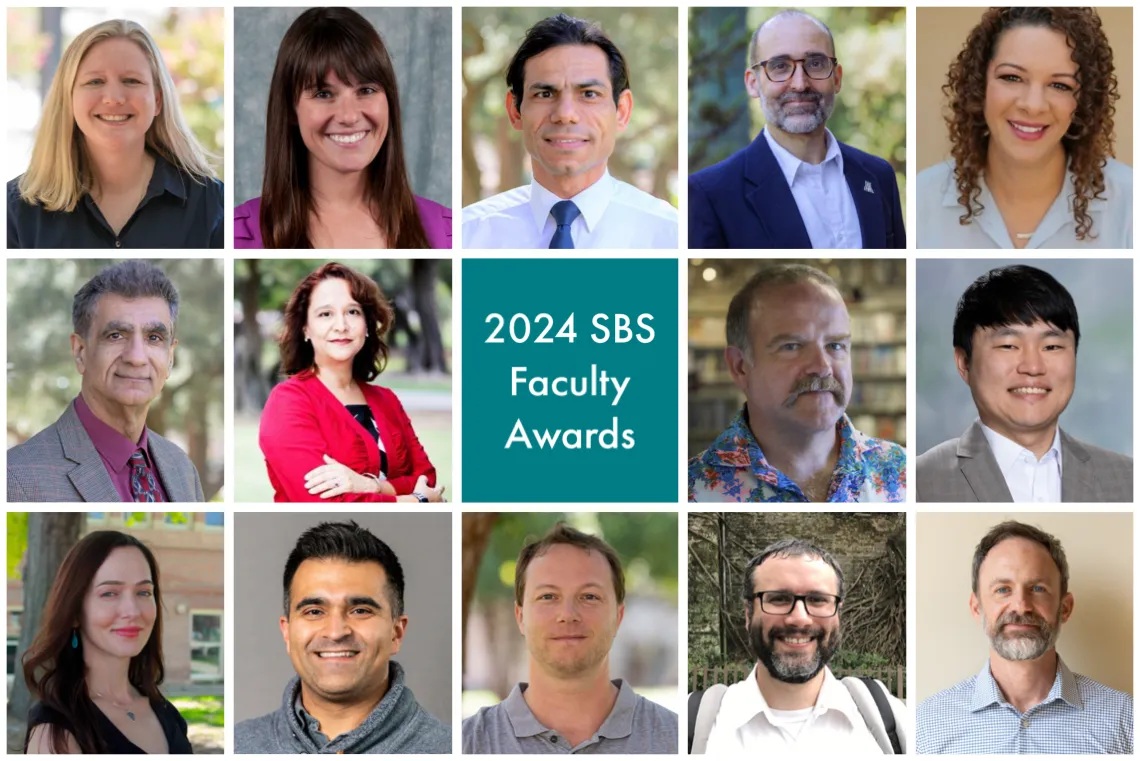
Congratulations to the 14 SBS recipients of the newly established 2024 SBS Faculty Awards from the College of Social and Behavioral Sciences, in recognition of excellence in research, teaching innovation, scholarship, entrepreneurship and innovation, service, and mentorship:
- Susan Brewer Osorio (International Research Award)
- Katie Hemphill (Teaching Innovation Award)
- Paul Milliman (Teaching Innovation Award)
- Eric Jackson (Early Career Teaching Award)
- Seung-Ho An (Early Career Research Award)
- Charles Gomez (Early Career Research Award)
- Mahmoud Azaz (Scholar of the Year Award)
- Claudia Powell (Scholar of the Year Award)
- Ada Wilkinson-Lee (Outstanding Public Scholar Award)
- Christopher Weber (Innovation and Entrepreneurship Award)
- Kamran Talattof (Outstanding Service Award
- Dennis Wise (Outstanding Service Award)
- Jessica Maves-Braithwaite (Outstanding Mentor Award)
- Ander Monson (Outstanding Mentor Award)
International Research Award
This award acknowledges the efforts required to conduct research in countries outside of the U.S. Nominees will have conducted fieldwork or worked with partners or graduate students in the field for a month or more outside of the U.S. and published that work in multiple academic venues.
Susan Brewer-Osorio, Assistant Professor, Latin American Studies and School of Government and Public Policy
Susan Brewer-Osorio, an assistant professor with joint appointments in Latin American Studies and the School of Government and Public Policy, is a conflict scholar specializing in the intersection of the war on drugs, peacebuilding, and security studies in Latin America. Brewer-Osorio has published several peer-reviewed chapters and articles and is at work on her forthcoming book, Peace Villages: Ex-Rebel Unity and Peacebuilding in Colombia, which will be submitted to Oxford University Press.
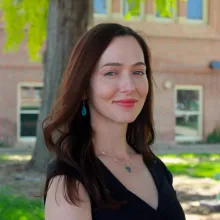
Susan Brewer-Osorio
Brewer-Osorio’s current research focuses on Columbia and the reintegration of armed combatants. In 2020, she participated in the U.S. support team for the Colombia Truth Commission and co-founded and actively participates in a network of scholars representing Colombia, Mexico and U.S.-based Latin Americanists, called Latin American Peace Science Society or, LAPSS.
Brewer-Osorio also created and served as the faculty director for the Conflict and Peacebuilding Program in Columbia and produced an archival project documenting the experiences of demobilized FARC combatants in Columbia.
“Usually, we only see this level of institutional connection and in-country engagement from faculty at a senior rank,” wrote Elizabeth Oglesby, associate professor of Latin American studies and geography, in her nomination letter. “Dr. Brewer-Osorio’s work is poised to become the new benchmark study for Colombia’s peace process, as well as for scholars interested in similar questions in other areas of the world.”
Teaching Innovation Award
This award acknowledges an individual (or group) who has successfully implemented an effective innovation, that provides students with exceptional learning experiences that are above and beyond what is expected in a traditional curriculum (e.g., experiential, service-learning experience, etc., that integrates global learning objectives and the environment).
Katie Hemphill, Associate Professor, Department of History
Katie Hemphill, an associate professor in the Department of History has created a popular general education class, History 187: Murder Most Foul: U.S. History through Flashpoint Murder Cases, as a way to leave behind the traditional expectations of a history course where “rote memorization and trivial recounting of knowledge” are the standard. Instead, Hemphill designed the true crime, historical homicide-focused class to incorporate digital tools, video, sound effects, and voice-overs to offer insight into societal issues — immigration, equity, race, gender, violence, and justice — that consistently challenge our country.
Hemphill’s student evaluations consistently report they enjoy her teaching and classes. “She is one of the best professors I’ve ever had, one of the reasons I added my history major.”
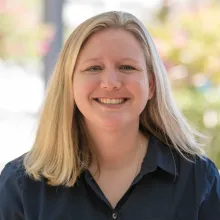
Katie Hemphill
In describing the creation of the class, Hemphill hoped to challenge the notion that history is boring. “I wanted them to see that critical thinking and analysis of evidence and narrative aren’t just skills for true crime consumption,” said Hemphill. “They are basic skills for success in history, in humanities in general, and for global citizenship more broadly.”
In her nomination letter, Katherine Morrissey, professor and head of the Department of History, praised Hemphill as a “phenomenal teacher.”
“She guides students in recognizing all sides of these complex matters and fosters analytical thinking about the past and present,” wrote Morrissey. “It is a terrific course in design, in content, in innovation, in purpose, and in pedagogy that captures the admiration of all of us.”
Paul Milliman, Associate Professor, Department of History
Paul Milliman, an associate professor in the Department of History, is committed to continuously redesigning and developing new courses, experimenting with emerging pedagogies, and exploring ways to partner with students in meaningful and fun undergraduate research opportunities.
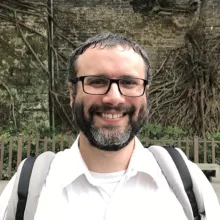
Paul Milliman
Using an experiential learning approach, Milliman employs non-traditional methods to help students combine critical thinking and engage innovatively with the curriculum. Instead of presenting their learning and research in tests and term papers, however, they present their research through experiential learning activities like cooking medieval recipes, creating medieval objects, or making their own games. Milliman encourages this “gamification” approach to learning, which he says started in the Middle Ages.
"Playing computer games is the first way many young people encounter history,” wrote Milliman. “Teaching with games at universities actually has a very deep history, because professors have been using board, dice, and card games to teach undergraduates since the very beginnings of universities in medieval Europe.”
Happy to help bring this pedagogy into the twenty-first century, Milliman also helped develop a program awarding college credit for playing Microsoft's Age of Empires IV. Recognizing the role of computer games in shaping historical understanding, he collaborated in creating "Illuminated Histories" as part of the game, offering in-depth historical content and analysis. This initiative aims not only to engage students with history but also to encourage them to pursue further education through Arizona Online.
“In my courses, students do just as much learning and research as in traditional history courses,” wrote Milliman. “They are not just consuming history. They are producing it. They are making history through experiential learning, which is the best way to learn anything."
Early Career Teaching Award
This award recognizes a faculty member’s exceptional teaching and who provides outstanding instructional excellence.
Eric Jackson, Assistant Professor of Practice, Department of Linguistics
Eric Jackson is an assistant professor of practice in the Department of Linguistics. Since joining the University of Arizona in 2021, he has taught eight different courses — primarily with the Master’s in Human Language Technology program. Seeing the need for improvement, Jackson has adapted teaching materials to better align with evidence-based teaching practices, the needs of specific student cohorts, and the teaching modality of each class to improve learning outcomes.
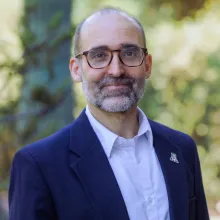
Eric Jackson
Jackson’s instructional success is in part because of his willingness to implement classroom and curriculum changes, and to facilitate opportunities for students to build confidence, owing to his genuine interest in positive outcomes for students. In a fully online, asynchronous course, Jackson created ways to increase student’s peer-to-peer interaction, opportunities for students to receive immediate feedback, and open-ended ways to allow students to engage with topics they are especially interested in.
“I put students’ learning and well-being first, and students can see that I’m committed to their learning and to their growth as individuals,” wrote Jackson.
In an in-person class, Jackson taught for the first time, he worked with a teaching consultant before the class started, to understand how to best take advantage of the resources in the room. He also adjusted course materials — initially designed for an online modality — to incorporate collaborative learning activities, in which students would apply new concepts in small groups.
“I know that my ability as an instructor improves with practice, with constructive feedback from peers, and through interaction with colleagues at the university who also aim to improve the learning experience for students,” wrote Jackson. “I hope to continually improve my own teaching, the teaching resources of colleagues, and the learning opportunities for many students at this university.”
Early Career Research Award
This award recognizes significant early career research contributions of tenure-eligible Assistant Professor faculty, early Career Track and Continuing Status faculty with 40 percent or more of research in their work distribution.
Seung-Ho An, Assistant Professor, School of Government and Public Policy
Seung-Ho An is an assistant professor in the School of Government and Public Policy whose research focuses on how organizational and environmental changes can affect the behavior of diverse stakeholders and public service delivery processes and outcomes.
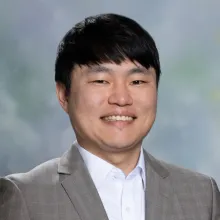
Seung-Ho An
Since joining the University of Arizona in 2019, An has published numerous articles in academic journals, reviewed over 150 manuscripts, and served as an editor or board member for five public administration and policy journals. He has been awarded five grants totaling nearly $3M, including two from the Department of Justice.
Two of An’s current projects center around citizen-state interactions. In collaboration with the Tucson Police Department, An’s focus is on reducing gun-related violent crimes in the city of Tucson through community violence interventions. Another project studies the recruitment and retention of public safety personnel — how community support affects public safety workers’ job satisfaction and turnover intention. For this work, he received a $250,000 grant from the Arizona Board of Regents.
An wrote that the partnerships with the Tucson Police Department have become “invaluable in developing grants and advancing my research agenda.”
About his significant contributions to the discipline and community in a relatively short time, An wrote, “My research work has appeared in top public and nonprofit management journals. In doing so, I have also built an excellent scholarly network worldwide: I collaborated with thirty-two scholars in public administration, nonprofit management, political science, economics, and psychology across eighteen institutions in South Korea, Denmark, and the United States.”
Charles Gomez, Assistant Professor, School of Sociology
Charles Gomez, an assistant professor in the School of Sociology, focuses on the sociology of science, the science of knowledge, bibliometrics, and the science of science. Transdisciplinary in his education, Gomez holds a Ph.D. in Sociology and International Comparative Education from Stanford University, a Bachelor of Science in Electrical Engineering, Physics and Philosophy from Duke University, a Master of Science in Applied Physics from Columbia University, and a Master of Public Policy in International and Global Affairs from Harvard University.
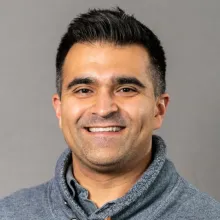
Charles Gomez
Gomez joined the University of Arizona in 2022 and has since published six peer-reviewed articles in journals such as Nature Human Behavior and Nature Communications. His article in Nature Human Behavior has been cited 43 times in the course of a year.
“Professor Gomez’s scholarly record includes multiple publications in premier outlets we would expect to be present in more senior faculty’s portfolio,” wrote Brian Mayer, professor and director of the School of Sociology in his nominating letter.
Gomez has also successfully secured external grant support. In addition to receiving a $250,000 award from the National Science Foundation’s Science of Science program as a sole principle investigator, he was recently awarded a National Science Foundation CAREER grant to further expand his research of structures of inequality in the global production of knowledge. This $480,000 five-year grant, “How Collaboration and Competition in the Emerging Field of Artificial Intelligence” is a premier award from the NSF for early career scholars.
“This award elevates Professor Gomez to the absolute top of the field and will be a significant launching pad for his future research,” wrote Mayer.
“By my account as an early career scholar, Professor Gomez is publishing cutting-edge research in premier research outlets that are interdisciplinary and international,” added Mayer. “This is exceptional work for junior faculty in our field of sociology and typically a pattern in much more senior researchers. To support this research, as well as other faculty and graduate students in our college, Professor Gomez was awarded $750,000 in just this last year alone. This funding supports multiple graduate students in our department and will undoubtedly help accelerate their own research success.”
Scholar of the Year Award
This award acknowledges faculty in SBS who have been especially productive in their research, academic, and/or creative endeavors. This should be for a number of scholarly or creative accomplishments, including, outstanding scholarly, academic, or creative endeavors (e.g., publications in top journals in the field; book awards, juried exhibition in widely recognized venue; major externally funded grant).
Mahmoud Azaz, Associate Professor, Middle Eastern and North African Studies; Director, Center for Middle Eastern Studies
Mahmoud Azaz — an associate professor in the School of Middle Eastern and North African Studies and director for the Center for Middle Eastern Studies — researches linguistic approaches to second language acquisition and sociocultural approaches and multilingualism — specifically centered on applied linguistics of Arabic language. Azaz has secured $240,000 in funding and has been active in publications — producing two books and authoring and co-authoring seven articles with publishers such as Oxford and Cambridge. Notably, he has two Arabic language textbooks accepted for publication, with one in production at Georgetown University Press.
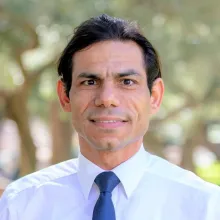
Mahmoud Azaz
Over the past four years, Azaz’s accomplishments include the publication of two single-authored books with Routledge and John Benjamins and authoring or co-authoring seven articles with six more under review. Additionally, he has two Arabic textbooks accepted, including one in production with Georgetown University Press, and a book translation of Arabic Language and National Identity by Yasir Sulieman. Azaz’s ongoing projects include a single-authored scholarly book on Arabic socio-pragmatics, a multi-authored book on Arabic second language learning, a co-edited special issue on multilingual approaches to Arabic, and two co-authored textbooks on Levantine and Moroccan dialects.
Azaz has shared his research through talks, keynotes, and workshops at prestigious institutions including Columbia University and NYU-Abu Dhabi. He regularly presents and organizes panels at leading conferences in applied linguistics and Arabic studies, such as the American Association of Applied Linguistics, Modern Language Association, and UCLA's Excellence in Pedagogy and Innovative Classrooms. Azaz’s contributions to Arabic second language learning earned him the 2022 Award for Excellence in Language Education and Program Direction from the American Association of University Supervisors, Coordinators, and Directors of Language Programs.
“This research is pushing the conversation on the teaching of Arabic in an exciting direction and one that also acknowledges the multilingual backgrounds of students in our modern classrooms,” wrote Julia Sylla, director of programs at Qatar Foundation International, of Azaz’s research-related talk at the Initiative for Multilingual Studies at Georgetown University.
Of his work and teaching, Azaz wrote, “Looking forward, as an applied linguist I will continue to shape the scholarly discourse around the connections between Arabic second-language acquisition research and classroom practice.”
Claudia Powell, Research Professor and Associate Director, SIROW
“Claudia Powell has had an amazing year of productivity, accomplishment, and impact, wrote Jo Korchmaros, research professor and director of Southwest Institute for Research on Women, or SIROW. “[She has] made an exemplary long-lasting and wide-reaching positive contribution to the University of Arizona’s and SBS’s research, teaching, and land grant missions.”
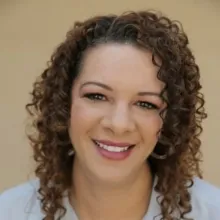
Claudia Powell
As a research professor and associate director of SIROW, Powell carries out several distinct roles. In 2023, she managed administrative responsibilities, taught two courses, and maintained productivity in research, scholarship, and service.
In 2023, Powell played a key role in bringing $18.8 million in extramural funding to the university. This funding from the Substance Abuse and Mental Health Services Administration, or SAMHSA, supports three newly -funded projects on which U of A and SIROW are the primary grantees. She was also instrumental in writing the application that led to a $6.9M grant from USAID, to fund the Niger Resilience and Agribusiness Master’s Program, or NRAMP.
In addition to securing significant funding, Powell led 14 research and action projects in 2023. She and her partners’ work addressed increased housing stability, decreased substance misuse, improved mental health, and decreased risk for HIV and sexually transmitted infections. Her collaborative projects and service activities had a local, national, and global impact: She shared her vast unique expertise and experience as a behavioral health, implementation science, social equity, and applied research expert with numerous community and university partners, U.S. governmental funding agencies, and developing researchers and scholars. In 2023, Powell collaborated with 19 community partners in the U.S., researchers from six different U of A units, and multiple individuals in Niger related to her work on NRAMP.
“Claudia’s contributions to U of A, SBS, SIROW, the local and national community, and multiple fields of study and practice in 2023 have been exemplary,” wrote Korchmaros. "This work will have long-term and wide-spread positive impact.”
Outstanding Public Scholar Award
This award recognizes faculty in areas of multiple types of public scholarship that include traditional outreach and also publicly facing scholarship and/or work that is more deeply collaborative with non-university groups or communities. The work is an integral part of the faculty member’s scholarly work.
Ada Wilkinson-Lee, Associate Professor, Department of Mexican American Studies
“As a Mexican American scholar from a border community, Dr. Wilkinson-Lee has incorporated and has become a leading expert in community-based participatory research (CBPR) approaches to research,” wrote Anna Ochoa O’Leary, head of the Department of Mexican American Studies. “Few may not appreciate what this type of work means: It involves building trust that must be sustained over time if the projects are to succeed; building of community networks of collaborators to address concerns, who can then organize or be organized to collectively respond to a range of public concerns; interdisciplinary collaboration and coordination; and it involves meaningful but time-consuming service in associations or community boards.”
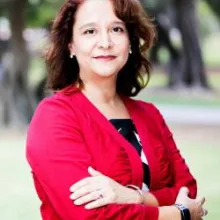
Ada Wilkinson-Lee
Ada Wilkinson-Lee, an associate professor in the Department of Mexican American Studies, holds a service leadership roles in the community: Arizona REACH Coalition Network, which supports local and community-driven efforts to achieve health equity throughout Arizona; the Arizona Association of Community Health Centers — a nonprofit member organization that represents Arizona’s largest primary care network of community health centers; and her role as Senior Science Advisor with the Pima County Health Department. Ochoa O’Leary wrote that Wilkinson-Lee’s work serves as “yet another outstanding example of her public scholarship ‘in action’ for improving the lives of the populations in Southern Arizona.”
Wilkinson-Lee’s public research and scholarship incorporates three important themes: issues of Latino health and ethnic/racialized group health disparities; challenges to identifying culturally appropriate public health interventions, and the important roles of community health workers (“promotoras”) who know their communities, engaging them to help build trust and rapport with university researchers.
“Dr. Wilkinson-Lee’s public scholarship is exemplary in reflecting community-centered research,” wrote Ochoa O’Leary. “Her work thus responds to a wide range of publics and constituents of our state.”
Innovation and Entrepreneurship Award
This award acknowledges innovation in a faculty member’s field or subfields that have a social or economic impact. This impact has improved the lives of community members locally or people in other areas of the world. Another area of innovation and impact may be related to students or entrepreneurial education. Another area that will receive consideration involves incorporating opportunities for students to engage in and learn about entrepreneurship and innovation as part of the course design.
Christopher Weber, Professor, School of Government and Public Policy
Christopher Weber, a professor in the School of Government and Public Policy, specializes in political psychology and political behavior, with a focus on American political campaigns and ideology.
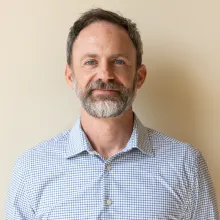
Christopher Weber
Weber is the creator of the Arizona Voter Project, or AVP — a non-partisan project that attempts to bridge gaps in Arizona voter data reporting by processing wide-ranging data sets and developing user-friendly analytical tools that are both free and accessible. The data is available on a website, which presents the information — insights into political dynamics, public voting and public opinion data sets, and political trends based on U.S. Census Data and other federal data sets — in an easy-to-read, coherent presentation that helps users make well-informed, evidence-based political decisions.
Moving forward, the AVP will expand its offerings to include organizing seminars and forums that will bring together social scientists, government officials, and experts from various fields to discuss policy and politics.
“Among the most urgent threats to American democracy is the preponderance of both misinformation and disinformation,” wrote Weber. “I believe data tools like those provided by the project occupy a key space to prevent systemic knowledge gaps in the electorate.”
Outstanding Service Award
This award acknowledges outstanding and distinguished contributions by a faculty member to the College of Social and Behavioral Sciences and the home unit.
Kamran Talattof, Professor, Middle Eastern and North African Studies
Kamran Talattof is a professor in the School of Middle Eastern and North African Studies, or MENAS, and founding chair of the Roshan Graduate Interdisciplinary Program in Persian and Iranian Studies. Since joining the University of Arizona in 1999, he has taught courses on classical and modern Persian literature and language, Iranian history and cinema, and Middle Eastern women’s writing.
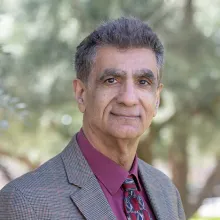
Kamran Talattof
Talattof has worked to establish a thriving Persian program and develop a more robust graduate studies program in MENAS. During his time in the department, he has secured grants to expand Persian course offerings and increase graduate enrollment. Talattof’s Innovative courses include Gender Issues and Women’s Literature in the Middle East, and Iranian Cinema, Gender Issues and Social Change.
Talattof received major grants from the Roshan Cultural Heritage Institute, which helped establish and fund three endowed faculty. He regularly organizes academic and cultural activities including films, lectures, visiting scholars, student support, and cultural activities. Through program development, distinction in his field, and global engagement through invitations to speak and participate at institutions such as the University of Bonn, Talattof has gained international recognition.
“In the midst of a demanding research agenda and teaching load, I have consistently dedicated significant efforts to service and leadership roles,” wrote Talattof. “I am deeply honored by the recognition of my home university, an institution I hold in the highest regard.”
Dennis Wise, Senior Lecturer, Department of English
Dennis Wise, a senior lecturer in the Department of English, studies the intersections between political theory, modern fantasy literature, science fiction, and horror. His work has been featured in several major journals and he has published more than two dozen book reviews and encyclopedia entries.
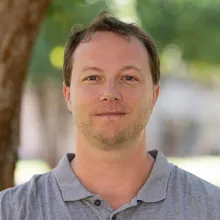
Dennis Wise
In 2023, the Department of English suffered two tragic losses — the department and associate department head — to medical issues. While an emergency acting department head was put in place, an associate head was still needed. Wise stepped in to help, navigating new budget and scheduling challenges. Through a combination of advertising and strategic scheduling, Wise achieved the highest summer enrollment in 23 years.
“After my experiences with the summer schedule, I started wondering if we couldn’t find a new, data-driven method for improving our department’s scheduling practices,” wrote Wise.
Drawing on his flair for statistics that comes from being a baseball fan, Wise created a spreadsheet to support his data analysis and shared the information with the department. Of the results he wrote, “I’m proud to report an immediate, positive impact on our spring 2024 enrollment numbers.”
Outstanding Mentor Award
Mentoring is a critical aspect of work in the academy and this award recognizes dedicated faculty whose work with others embodies transformational mentoring with inclusion, access, equity, belonging, and other holistically supportive aspects of the work being exceptional. This award honors faculty who are extraordinary in mentoring any, some, or all of the following members of our community: peers, early career scholars, future scholars, undergraduate and/or graduate students.
Jessica Maves-Braithwaite, Associate Professor, School of Government and Public Policy
Jessica Maves-Braithwaite, associate professor and director of graduate studies in the School of Government and Public Policy, or SGPP, researches international relations, human rights and repression, and conflict. In her professorial role, she is the co-creator of the Foundations of Rebel Group Emergence Dataset, and her work has been published in academic journals such as the Journal of Politics, Journal of Peace Science, and Conflict Management and Peace Science.
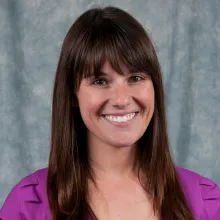
Jessica Maves-Braithwaite
As the director of graduate studies for SGPP, Maves-Braithwaite mentors in a variety of roles: junior faculty colleagues, honors thesis advising to undergraduate students, and faculty mentor to the U of A Model United Nations club. Currently, she serves as a primary advisor to six students in the SGPP Ph.D. program (representing 25% of the students currently active in the Ph.D. program), who are in various stages of the process — from first to fifth year.
Nominated by this group of six graduate students, Maves-Braithwaite demonstrates a passion for student success, a deep commitment to facilitating a diverse range of academic experiences, and a dedication to nurturing a collaborative and dynamic scholarly environment.
“Dr. Braithwaite gave direct and unstinting support while developing and finishing his second-year project—a major program milepost, and during [my] preparation for a successful comprehensive examination this year,” wrote Herbert Tinsley, a third-year Ph.D. candidate and current advisee. “She has been so alert to [my] needs that she went so far as to facilitate scheduling with the exam committee when technical issues arose.”
Second-year Ph.D. candidate Chaelin Kwon and Maves-Braithwaite collaborated on a project during which she encouraged Kwon to take the first-author role in the research process and offered opportunities to present the working paper at well-known venues and workshops. “These conference experiences not only honed [my] presentation skills but also fostered a deeper understanding of scholarly discourse and provided invaluable networking opportunities,” wrote Kwon.
“Beyond all of these tangible improvements to our academic lives, Dr. Braithwaite ensures a friendly and comfortable setting where we freely debate ideas,” wrote the nominating group. “She facilitates our paths and provides every support in her power.”
Ander Monson, Professor, Department of English
Ander Monson — a professor in the Department of English and director of the undergraduate program in creative writing — is the author of nine books, a Guggenheim Fellow, and the recipient of numerous writing awards and prizes. In addition to teaching and writing, Monson is the editor and publisher of the journal DIAGRAM and the New Michigan Press.
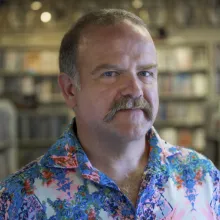
Ander Monson
Calling Monson a “highly charismatic leader in the field,” Kate Bernheimer, professor in the Department of English wrote in her nomination letter, “He embodies the very essence of our institution’s mission to foster a thriving collective undergraduate and graduate community."
Monson has demonstrated exceptional teaching ability and pioneered innovative approaches, specifically in creative nonfiction. In fall 2024, he will teach a creative writing course open to graduate students and advanced undergraduates, representing diverse voices and experiences. Monson engages his students in and outside the classroom, by way of service-oriented projects that encourage literary engagement and provide crucial inspiration to students.
His recent “Memory Vending Machines” project — installed on campus — allows anyone to drop in a quarter and experience technology and storytelling in the form of a plastic egg in which is enfolded a short essay. Each essay, authored by students of creative writing, “Is a meticulous blend of research, emotion, and artistry, and represents the literary genre in which Professor Monson is world-renowned,” wrote Bernheimer. His impressive list of former alumni closely mentored by him includes many who have become university-based creative writing faculty and established authors in their own right.
“Monson has a tremendous capacity for work, whether artistic or institutional, into which he dives with a spirit of adventure," wrote Regents Professor Emeritus of Creative Writing Allison Deming. "This energy has infused his teaching and service, where he is known for his boundless generosity. He is a trusted advisor and insightful mentor, always available to students. He seems to ideally embody the principle of a unity of purpose and performance across research, teaching, and service.”
##

